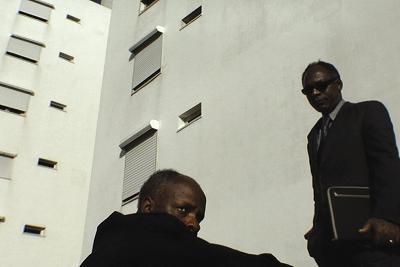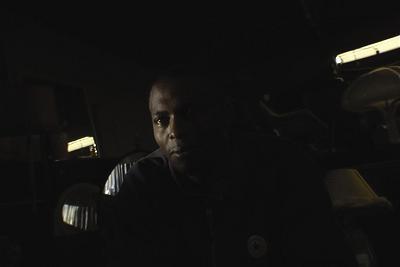Thank you Scott Foundas
(his defense of
Colossal Youth):
"There were few if any boos at the end of the press screening of Portuguese director Pedro Costa’s
Colossal Youth, but that was because anyone likely to jeer (including the entirety of the three rows seated in front of me) had long ago fled the theater — many of them during the scene in which a methadone addict named Vanda pours forth a long, rambling monologue about childbirth, while a man called Ventura, who may or may not be Vanda’s father, listens inexpressively. Like all of the characters in Colossal Youth, Vanda and Ventura are “played” by real Cape Verdean immigrants enacting thinly fictionalized versions of their own lives, and to the extent that the film has a plot, it’s about how Ventura’s already tenuous existence descends into chaos when the demolition of the Lisbon housing project where he has lived for more than 30 years coincides with his wife’s decision to leave him. From there, Ventura sets out on an itinerant odyssey, dazedly wandering between his gutted-out former residence and a couple of prospective new ones, crossing paths with a succession of similarly displaced and/or dispossessed persons whom he refers to as his 'children.'
"Developed by Costa in close collaboration with his nonprofessional cast, many of whom contributed their own storylines and dialogue, Colossal Youth was whittled down by the director from more than 300 hours of footage shot over a 15-month period. The result is a harsh, nightmarish and often terribly beautiful film set against a world of peeling paint and crudely nailed planks, through which moves this solitary man grasping at the flickering embers of some real or imagined past. It is a movie in which marginal people living on the edges of society are treated with dignity and allowed to tell their own stories in their own unmistakable voices. And it is quite unlike anything that you or I have ever seen before.
"It’s no exaggeration to say that
Colossal Youth was the single most divisive film at Cannes in 2006. Even before anyone had seen it, some Costa detractors were badmouthing the film up and down the Croisette, accusing the director of being a fraud championed by a few highbrow critics said to get off on his films’ impenetrability. It was a sentiment summarized succinctly by the Variety review, which opined that the film would “hold the Portuguese director’s coterie of fans in rapt attention while proving a colossal bore to everyone else.” But does the fact that a movie is destined to reach only a limited audience prevent it from being great? I grant that
Colossal Youth isn’t for everyone: The pacing is slow (there are maybe 30 or 40 shots over the course of two and a half hours of screen time), and sometimes we are looking, for minutes on end, at two people lying on a bed watching TV, or sitting in a cramped, dimly lit room playing cards. Yet in the week since I saw the film, it has haunted my dreams and is still with me upon waking. If there were many good movies in Cannes this year, and perhaps even a couple of great ones,
Colossal Youth is the only one I would venture to call heroic.
"The decision of the Cannes programmers to include
Colossal Youth in the official competition struck even some of the film’s admirers as perverse, but to my mind it is the very sort of radical gesture by which Cannes continues to define itself. Like several other filmmakers who premiered new films at the festival this year — including the Argentine Lisandro Alonso and the Paris-based American expat Eugène Green — Costa is a director whose work is scarcely known within the borders of his own country (let alone elsewhere) and who needs a stage like Cannes upon which to present it, lest he follow in the footsteps of so many great artists not duly recognized in their own lifetimes. "
http://www.laweekly.com/film+tv/film/let-them-eat-film/13650/#Continuation





 COLOSSAL YOUTH
COLOSSAL YOUTH